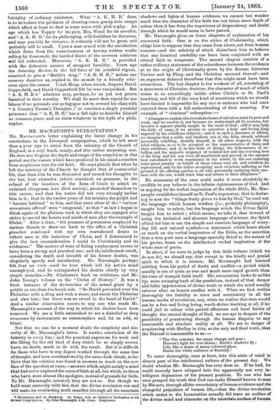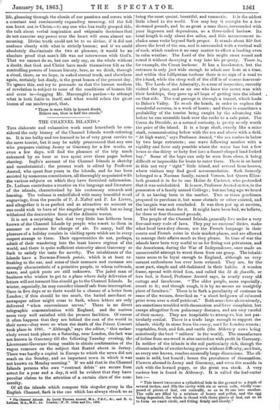MR. M ACNAUG HT'S RETR A.CTAT 10N.* Mn. MACSAUGHT'S letter
explaining the latest change in his convictions to the Liverpool congregation, which he left more than a year ago to retire from the ministry of the Church of England, is a lief, frank, manly, and also rather surprising one. He does not disguise the depth and range of his scepticism at that period, nor the causes which have produced in his mind a reaction from scepticism into the old faith. He says plainly that when he left the ministry of the Church he thought first of commercial life, that from this he was dissuaded and turned his thoughts to the bar, that obstacles (which consisted, we presume, in the refusal of the benchers of the Inns of Court to admit an ordained clergyman into their society), presented themselves to this career, and that his tastes did -nOt very strongly incline him to it ; that in the twelve years of his ministry the pulpit had "become habitual" to him, and that none other of the "various avocations offered" were "congenial," so that "at last I began to think again of the glorious work in which they are engaged who strive to mould the hearts and minds of men after the example of Christ." After a time, "the pressure of persuasion employed by various friends to draw me back to the office of a Christian preacher combined with my own reawakened desire to exhort men to the imitation of Christ, and I determined to give the best reconsideration I could to Christianity and its evidences." The motive of want of fitting employment seems to have been a strong and practical one; and the intellectual result, considering the depth and breadth of his former doubts, was singularly speedy and satisfactory. Mr. Macnaught perhaps felt that no view could be true which left his active mind unemployed, and he extinguished his doubts chiefly by very simple remedies,—Dr. Chalmers's book on evidences, and Mr. John Young's volume on the "Christ of History." It was a fresh instance of the destruction of the armed giant by a pebble or two from the brook-side. "So David prevailed over the Philistine with a sling and with a stone, and smote the Philistine and slew him ; but there was no sword in the hand of David." And a similar observation occurs to any one who reads Mr. Macnaught's account of the way in which his doubts have been removed. We are a little astonished to see a disbelief so deep overcome by instruments so commonplace and, let us add, so blunt.
Not that we can for a . moment doubt the simplicity and sin- cerity- of Mr. Macnaught's letter. It carries conviction of its honesty in every line ; and the practical eagerness for work and the liking for the old kind of duty which lie so simply avows, have, no doubt, much to do with the result. But it is difficult for those who have in any degree worked . through the same line of thought, and been overshadowed by the same dark clouds, to be- lieve that the solution was found in answers so much on the sur- face of the question at issue,—answers which might satisfy a mind that had never explored the roots of faith at all, but which, to those who have, seem almost like apologies, instead of grounds for faith. To Mr. Macnaught, certainly they are not so. But though we hold most earnestly with him that the divine revelation can and will make its everlasting truth manifest through all the uncertain • Mristianity and its Evidences. An assay, with an Epistle-of Dedication to his
former Congregation. By John Macnaught, Oxon. I.onginans.
shadows and lights of human evidence, we cannot but wonder much that the character of his faith has not taken more depths of colour than it has from the experience of despondency and doubt through which he would seem to have passed.
Mr. Macnaught gives us three chapters of explanation of his recovered faith. One is on the ethics of Christianity, which oblige him to suppose that they came from above, not from human sources—and the sobriety of which disinclines him to believe that any fanatical credulity can have been conjoined with an ethical faith so temperate. The second chapter consists of a rather ordinary statement of the coincidence between the evidence as to the origin of Christianity given by the Roman historian Tacitns and by Pliny, and the Christian account thereof—and an argument deduced therefrom that this origin must have been miraculous. The last chapter is the weakest of all, consisting of a statement of Christian doctrine, the character of much of which seems to us exceedingly unlike either Christ's or St. Paul's teaching, and full of the very kind of assertions which we should have fancied it impossible for any one to embrace who had once rejected them with a full understanding of their meaning. For example, of "vicarious" redemption :—
" Attempts to explain this revealed scheme of salvation must be poor and weak, and we receive it, not because we understand all its reasons, but because it appears plainly taught in the word of God ; still it may help the faith of some if we picture to ourselves a holy and loving king angered by his rebellious subjects; and if, in such a juncture of affairs, we imagine that a noble and obedient son of the king should, without personally rebelling, identify himself, in all other respects, with the rebel subjects, so as to be accepted as the representative of them and their rebellion ; and if, in this state of things, the hideousness of re- bellion and the majestic exigency of violated law and the rescuing love of the king and his son were all manifested and proved, in the manner best calculated to work repentance in the rebels, by the son enduring some great penalty on behalf of those whose very sin and rebellion he represented, and by the father accepting such vicarious suffering as the ground of his offering pardon to all who, personally ratifying their one- ness with the son, would trust him and return to their allegiance."
No statement of the case could make it more absolutely in- credible to any believer in the infinite righteousness of God. And in arguing for the verbal inspiration of the whole Bible, Mr. Mac- naught establishes himself on St. Paul's expression, that in declar- icg to men the "things freely given to him by God," lie used not the language which human wisdom (i.e., probably philosophy),
taught him to select, but the language which the Divine Spirit taught him to select ; which means, we take it, that instead of using the technical and abstract language of science, the Spirit of God led him to use the simple and concrete language of every- day life and natural symbols—a statement which bears about as much on the verbal inspiration of the Bible, as the assertion that a true poet uses a language specially fitted to the nature of his genius, bears on the intellectual verbal inspiration of the whole race of poets.
In short, if we were to judge by this little volume (which we do not do), we should say, that except in the kindly and genial spirit in which it is written, Mr. Macnaught had learned nothing from his period of doubt and conflict—a period which
usually is one of quite as true and much more rapid growth than the time of tranquil faith itself. His retractation looks to us like the mere swinging back of the pendulum, instead of that deeper and fuller appreciation of divine truth to which the mind usually returns after an honest conflict with it. When we first realize thoroughly the liability to error and uncertainty in all the human media of revelation, nay, when we realize that man would not be a free and living being, worth divine teaching at all, if he could fail to colour with partial affections and local habits of thought the eternal thought of God, we are apt to despair of the possibility of penetrating through the human disguise to any inscrutable and absolute reality at all. We are in danger of acquiescing with Shelley in this, as the only and final truth, that
the Eternal is inaccessible to us :—
"The One remains, the many change and pass ; Heaven's light for ever shines ; Earth's shadows fly ; Life, like a dome of many-coloured glass, Stains the white radiance of Eternity."
To enter thoroughly, once at least, into this state of mind is almost part of the-intellectual culture of the present day. We doubt whether Mr. Macnaught has ever done so. If he had, he could scarcely have relapsed into the apparently not very ia- telligent dogmatism of his present position. To one who has once grasped the truth that God can make Himself known to man by His acts, through all the uncertainty of human.evidence and the changeful prejudices of human life,—that the divine revelation which ended in the Incarnation actually did trace an outline of
the divine mind and character on the uncertain surface of human
life, gleaming through the clouds of our passions and errors with a constant and continuously expanding meaning, till the full sun burst out in Christ,—to any one who has really grasped this, the talk about verbal inspiration and enigmatic doctrines that do not exercise any power over the heart will seem almost un- meaning. Divine truth could not be to us divine, if it did not coalesce closely with what is strictly human ; and if we could absolutely discriminate the two at pleasure, it would be an absolute proof that man's life was not interwoven with God's. That we cannot do so, but can only say, on the whole without a doubt, that God and Christ have made themselves felt as the controlling powers of human history, here, as we think, through a cloud, there, as we hope, in naked eternal truth, and elsewhere again, certainly but dimly, is the great lesson of the present day. To ignore this, and try to persuade us that the human medium of revelation is subject to none of the conditions of human life and error is—begging Mr. Macnaught's pardon—to attempt what is both futile in itself, and what would refute the great lesson of our modern poet, that,
"There is more faith in honest doubt, Believe me, than in half the creeds."































 Previous page
Previous page